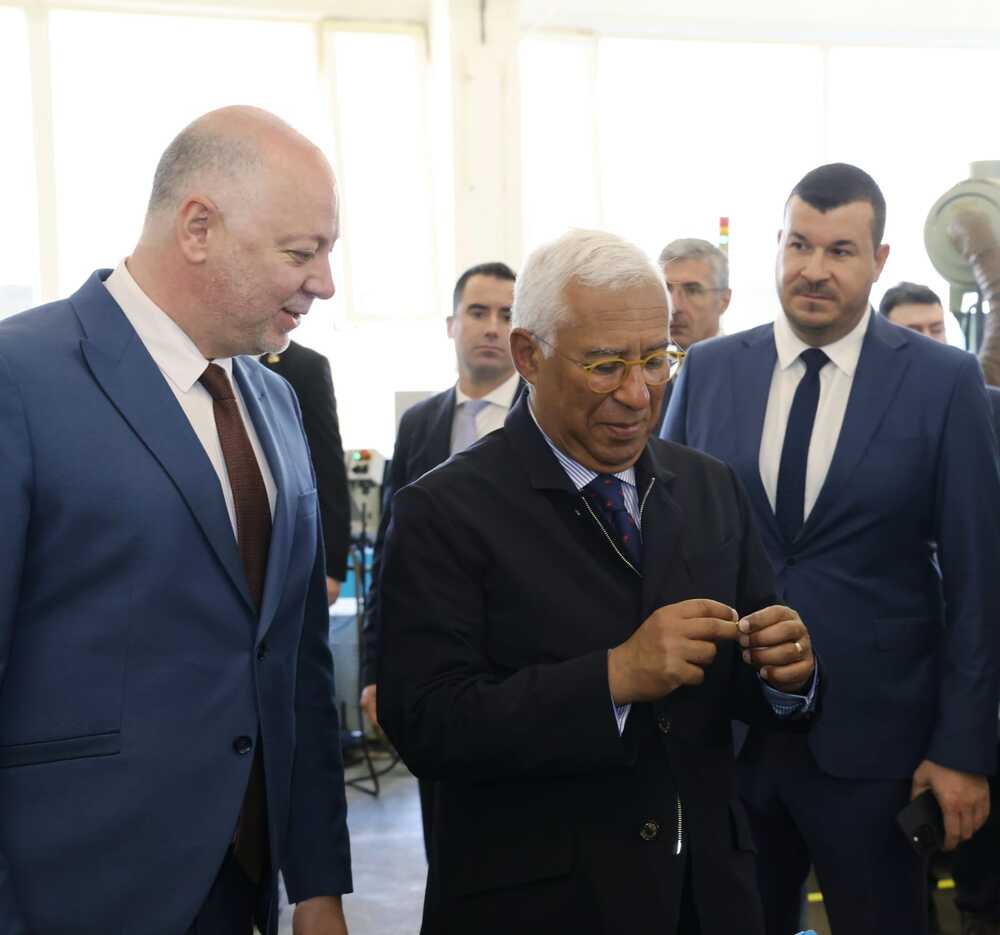site.btaEuropean Council President Antonio Costa Continues Bulgaria Visit, Touring Arsenal Military Plant, Aquaponics Centre


European Council President Antonio Costa continues his visit to Bulgaria. Today, April 28, he and Bulgarian Prime Minister Rosen Zhelyazkov visited the Arsenal military plant in Kazanlak and the Aquaponics Centre at Trakia University in Stara Zagora.
Talks between Zhelyazkov and Costa focused on the Bulgarian government's priorities for boosting industrial growth, promoting innovation, and building a high-tech economy in the context of European competitiveness, the Government Information Service said on Monday.
The delegation’s visit to the Arsenal military plant in Kazanlak was aimed at presenting the opportunities for development, modernization and strengthening of Bulgaria's role in building European defence capabilities. The company's management presented the technological capabilities of the plant, the main production facilities, as well as the modernization processes that are currently being actively implemented.
The President of the European Council pointed out that competitiveness and defence are the two most important priorities for the EU. He explained that investment in defence not only guarantees security but also creates jobs, ensures regional development, and promotes overall growth. He added that this had been evident during his visit to the Arsenal military plant in Kazanlak. The plant, he noted, is an example of how the goals of defence and competitiveness can be unified and how this contributes to supporting Ukraine.
Later in the day, Zhelyazkov and Costa visited the Aquaponics Centre at Trakia University in Stara Zagora – a unique educational, research and industrial project dedicated to ecological production in a controlled environment and spanning 4,000 square metres. The delegation was briefed on the opportunities presented by this first-of-its-kind project in Eastern Europe and the potential of aquaponic farming, which is organic, highly efficient, and allows for year-round production.
Aquaponics combines the cultivation of fish and plants within a shared aquatic ecosystem. Greenhouse structures and computerized equipment that precisely controls temperature and other key factors ensure optimal growing conditions. This technology enables maximum yields throughout the year, regardless of seasonal changes, with minimal water required.
At a joint press conference in Stara Zagora, Zhelyazkov stressed that the Bulgarian Government will request the activation of a national derogation clause from the European Commission to allow defence investments without affecting budgetary rules. He said that a decision to this effect will be adopted this week at the regular meeting of the Council of Ministers. With this national derogation clause, defence spending within the framework of the deficit criteria established will be excluded, as the provision on derogation from the Stability and Growth Pact foresees, he said. He reminded journalists that Bulgaria was one of the countries that proposed this option.
“This year, defence spending is over 2% of the gross domestic product, and the Government's intention is to increase the expenditure, taking advantage of the opportunity to activate the clause for excluding the rearmament projects that are implemented under the European Union's initiatives for joint acquisition from the State Budget deficit,” the Prime Minister said. According to him, through this derogation and the coordinated activation of the national clause, Bulgaria has the opportunity to invest more in defence, provided that this does not threaten fiscal stability. “These investments will amount to up to 1.5% of GDP on an annual basis, with the reference year being the year before the war in Ukraine,” the Prime Minister said, adding that this applies to a period of 4 years.
European Council President Antonio Costa said that “in these uncertain times, it is more important than ever to join forces”. “This is why I found it very important not to visit only the capital, Sofia, but to visit different regions in the country,” Costa added.
Costa mentioned that at Trakia University, he had the opportunity to see how innovative technologies can unite the fisheries and food production sectors and change the traditions people are accustomed to. He said that it was inspiring to see how Bulgaria's economy is developing and becoming more diversified and improved. According to him, knowledge is the foundation of a more competitive economy, which is why education and science are crucial for the collective future.
On Tuesday, the delegation is set to visit the Institute for Computer Technologies and Artificial Intelligence (INSAIT). Costa said that this institute would become one of the six artificial intelligence factories in Europe and emphasized that this illustrates the activity of Bulgarian society and economy, as well as Bulgaria's contribution to a more prosperous and advanced European Union.
The President of the European Council’s official visit to this country started in Sofia on Sunday, where he conferred with Prime Minister Rosen Zhelyazkov and President Rumen Radev.
/KK/
Additional
news.modal.image.header
news.modal.image.text
news.modal.download.header
news.modal.download.text
news.modal.header
news.modal.text











